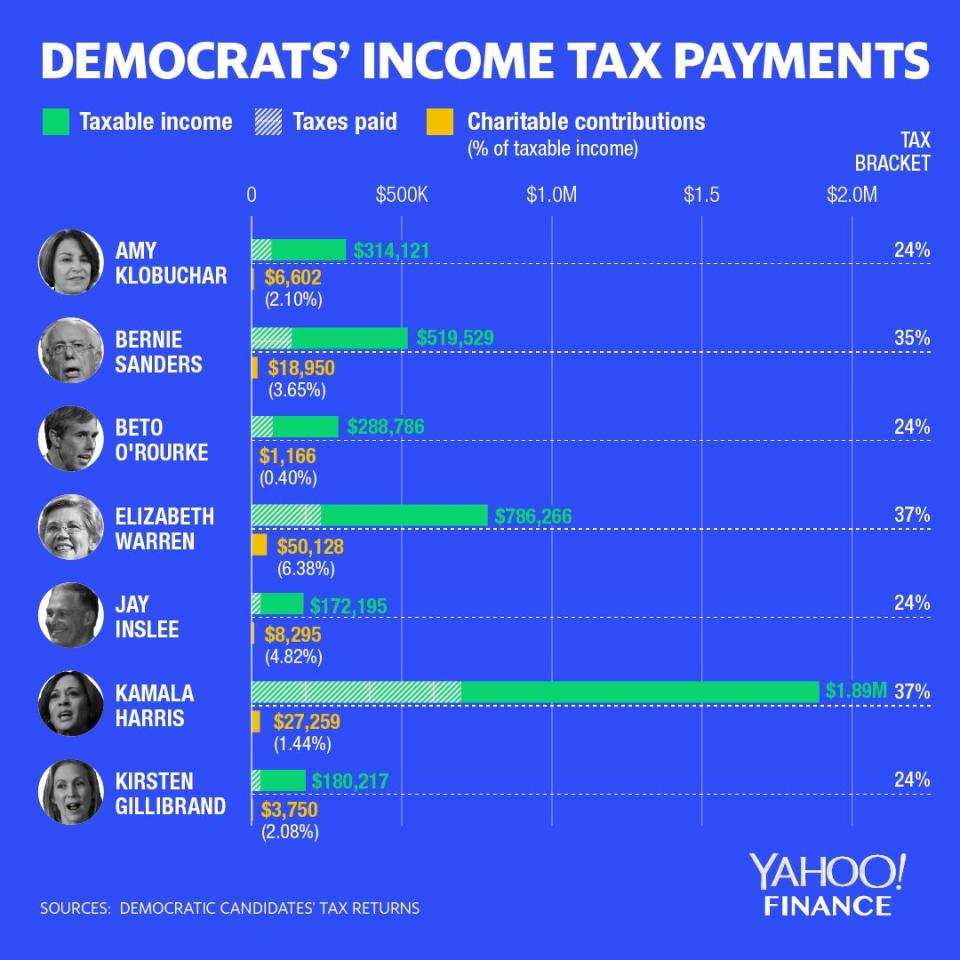4 things missing from Democratic presidential tax returns
Irony has joined the Democratic presidential campaign.
Millionaire-basher Sen. Bernie Sanders earned more than $1 million in 2016 and 2017, and a tidy $520,000 last year. The fame Sanders garnered as a presidential candidate allowed him to write two best-sellers about the leftist agenda he hasn’t managed to impose. But if he did, he’d end up sharply raising his own taxes, since he’d be subject to the new 43% Sanders tax rate instead of the current 35% rate—with deductions—he landed at in 2018. That would have raised his tax bill by at least $30,000.
This nifty narrative has distracted attention from some of the important things we don’t yet know about the Democratic presidential candidates and their finances. Here are 4 gaps in the picture.
We only have recent tax returns for 7 Democratic candidates. Of the 18 prominent Democrats who are running, here are the ones who haven’t yet released tax returns for 2017 or 2018: businessman Andrew Yang, Sen. Cory Booker, Rep. Eric Swalwell, former Rep. John Delaney, former Colorado Gov. John Hickenlooper, former San Antonio Mayor Julian Castro, South Bend, Ind. Mayor Pete Buttigieg, Rep. Tim Ryan and Rep. Tulsi Gabbard.
Releasing tax returns is essentially a requirement for Democrat candidates at this point, especially since the House of Representatives could end up suing President Trump to get six years of his returns. So let’s assume all the Democrats will do it. Some filers get extensions to deal with complicated returns, and triple-checking all the numbers is fine. But any Dems who haven’t released returns by the fall will be suspect.

Joe Biden might have a Hillary Clinton problem. Biden, widely expected to enter the race as a front-runner, has been giving five- and maybe six-figure speeches since he finished two terms as vice president in 2017. There’s nothing wrong with that, except it could turn off voters if Biden seems to be living the high life while pretending to be Ordinary Joe. Hillary Clinton had this problem in 2016, after she earned $10 million a year giving speeches to Wall Street banks and other groups. Clinton dutifully released her tax returns, but struggled to convince working-class voters of her authenticity. Biden is a more spontaneous candidate and might fare better. But voters can turn quickly against candidates if they sense creeping elitism.
Tax returns don’t reveal wealth. Beto O’Rourke, for instance, earned a relatively modest $370,000 in total income 2017—even though his net worth is probably $9 million or more. O’Rourke inherited some wealth and married into more, with a father-in-law who may be worth $500 million. The wealthiest Democrat in the race could turn out to be former Maryland Rep. John Delaney, who founded and ran two successful financial firms before running for Congress in 2012. Financial disclosure forms suggest his net worth could be as high as $370 million, according to the Center for Responsive Politics.
Such wealth typically shows up on tax returns as capital gains, and then only if you sell assets at a profit. So tax returns can significantly understate wealth.
Voters won’t necessarily punish candidates for being rich—Donald Trump, who brags about his wealth, proves that. But one risk for wealthy candidates who earn most of their income from capital gains is the relatively low tax rate on such income. During the 2012 presidential race, for instance, Mitt Romney’s 2010 return showed he paid an effective tax rate of just 13.9% on $21.7 million in income. That’s lower than the rate many middle-class families pay because the tax rate on most capital gains is just 15%—and the top rate is only 20% – while the top tax rate on labor income is 37%. Nobody’s breaking the law by paying the capital-gains rate, but some voters think it’s a raw deal.
The looming billionaire. If former Starbucks CEO Howard Schultz decides to run, he’ll be the richest candidate in the race, with a net worth of more than $4 billion—about $1.4 billion more than Trump. Schultz says he’ll run as an independent if he enters the race, even though he’s been a lifelong Democrat. He also says he’ll release his tax returns, which could overshadow every other candidate’s meager earnings and put Trump in a worse light for refusing to release his.
Many forecasters think Schultz can’t possibly win as an independent. But he could influence the outcome, and possibly change the narrative about wealth and income. Bernie Sanders might be grateful.
Confidential tip line: rickjnewman@yahoo.com. Encrypted communication available. Click here to get Rick’s stories by email.
Read more:
Winter is coming for big business
Why Trump wants to manipulate the Federal Reserve
The Mueller probe was money well spent
Why voters will reject the "Green New Deal"
Voters are souring on “Medicare for all”
3 problems with Elizabeth Warren’s wealth tax
Rick Newman is the author of four books, including “Rebounders: How Winners Pivot from Setback to Success.” Follow him on Twitter: @rickjnewman

 Yahoo Finance
Yahoo Finance 
